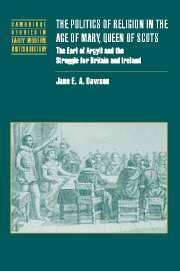 The Politics of Religion in the Age of Mary, Queen of Scots
The Politics of Religion in the Age of Mary, Queen of Scots Book contents
- Frontmatter
- Contents
- List of figures
- Acknowledgements
- List of abbreviations
- Prologue: 1560: British policies and the British context
- 1 Argyll's life and character
- 2 Semi-sovereign prince
- 3 The creation of a British policy: 1558–1560
- 4 The collapse of amity: 1561–1565
- 5 The reconfiguration of British politics: 1566–1568
- 6 The withdrawal from British politics: 1569–1573
- Conclusion: The earl of Argyll and British politics in the age of the three kingdoms
- Chronology, 1558–1573
- Bibliography
- Index
Conclusion: The earl of Argyll and British politics in the age of the three kingdoms
Published online by Cambridge University Press: 20 July 2009
- Frontmatter
- Contents
- List of figures
- Acknowledgements
- List of abbreviations
- Prologue: 1560: British policies and the British context
- 1 Argyll's life and character
- 2 Semi-sovereign prince
- 3 The creation of a British policy: 1558–1560
- 4 The collapse of amity: 1561–1565
- 5 The reconfiguration of British politics: 1566–1568
- 6 The withdrawal from British politics: 1569–1573
- Conclusion: The earl of Argyll and British politics in the age of the three kingdoms
- Chronology, 1558–1573
- Bibliography
- Index
Summary
Argyll's political career opens a window onto the ‘British problem’, reflecting in microcosm an image of the world of British politics. It reveals many of the inherent tensions bedevilling the relationships between the three kingdoms, particularly after 1603. In particular, Argyll personified the choice facing Scottish and Irish Gaelic nobles between confrontation or harmonisation of the Anglophone and Gaelic cultures within the Atlantic archipelago. Before mature British politics had been created by the multiple monarchy, the 5th earl confronted the hurdle faced by future British politicians, especially those based in Scotland or Ireland, which was the fundamental conflict of attitudes towards the islands of Britain themselves.
Argyll's British policy contained two elements. The first was its British idiom: the ability to see the interconnections between the three kingdoms and, at the level of conceptual thinking, create a British strategy. The second was a corollary: the capacity to integrate national and regional objectives within a single scheme, unifying the elements in the service of a British goal. His own British perspective had grown out of his experience of moving between the separate political arenas of Gaeldom and Anglo-Scottish relations, where he operated in multiple cultural and conceptual worlds and found solutions to transect frontiers. By contrast, his contemporaries and most future politicians were tied to a single political world, with little understanding or appreciation of other viewpoints.
- Type
- Chapter
- Information
- The Politics of Religion in the Age of Mary, Queen of ScotsThe Earl of Argyll and the Struggle for Britain and Ireland, pp. 209 - 219Publisher: Cambridge University PressPrint publication year: 2002


